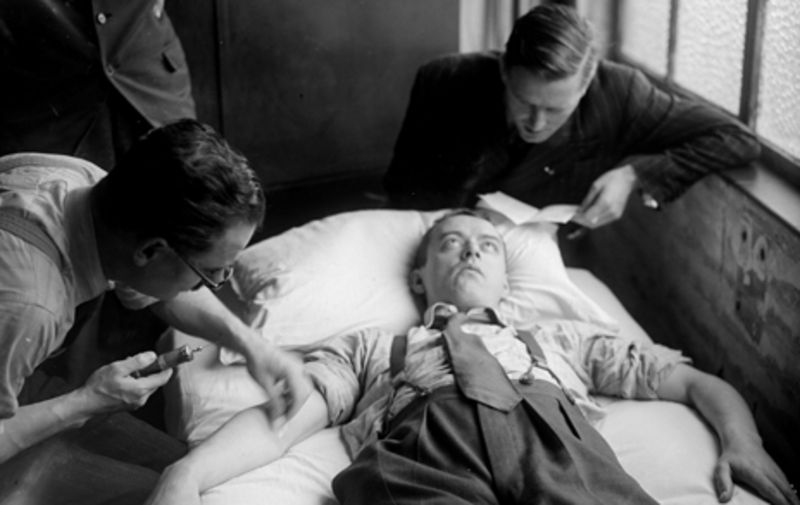source:
https://www.bbc.com/news/magazine-24371140Honestly ? See the source link for the video.
Can a drug make you tell the truth ?In movies and TV dramas, sodium thiopental is shown as a sinister truth serum used to get information out of captured people. Michael Mosley tried it out on the video (source link, above) Truth drug experiment, Britain 1945
Truth drug experiment, Britain 1945One of the great challenges of living in our society is knowing when people are telling the truth or not. We lie all the time and are remarkably bad at detecting when other people are deliberately deceiving us.
There are lots of urban myths about lie detecting, such as the claim that liars tend to look away, twitch their feet or touch their noses when lying (the so-called Pinocchio effect).
In study after study, it has been shown that professionals such as policemen are no more reliable at detecting liars than the rest of us. So it's not surprising that for many years scientists have been working to develop "truth drugs" - drugs that will make you open up and tell all you know to an interrogator.
One of the oldest and best known of these truth drugs is sodium thiopental. Although it was first developed in the 1930s, it is still used today in a range of settings, including, in some countries, by the police and the military.
I was intrigued but also extremely sceptical about the claims that
sodium thiopentalWiki, originally developed as an anaesthetic, could make people speak the truth if they chose not to. So I decided, as part of a series I've been making on the extraordinary history of pharmaceuticals, to try it out.
Sodium thiopental is part of a group of drugs called barbiturates, drugs widely used in the 1950s and 60s to help people sleep better. They are no longer used for that purpose because they are extremely addictive and potentially lethal - Marilyn Monroe famously died from a barbiturate overdose.
I decided to take a low dose of sodium thiopental under proper medical supervision, with anaesthetist Dr Austin Leach monitoring my vital signs throughout. Barbiturates work by slowing down the rate at which messages travel through the brain and spinal column.
The more barbiturates there are, the harder it is for chemical messages to cross the gaps between one neuron and the next.Your whole thinking process slows down until you fall asleep. With thiopental, that happens very quickly indeed.
Although it was originally developed as an anaesthetic,
it was soon noticed that when patients were in that twilight zone halfway between consciousness and unconsciousness, they became more chatty and disinhibited.
After the drug had worn off, the patients forgot what they had been talking about.
It was decided that sodium thiopental might form the basis for a truth drug, an interrogation tool. But does it really work?
I decided that I would have a go at trying to maintain the fiction that rather than being Michael Mosley, science journalist, I would be Michael Mosley, famous heart surgeon. We started with a very low dose. Immediately I felt extremely light-headed, intoxicated. But would this make me more inclined to speak the truth?
Is is assumed that Sodium thiopental may work on our brains in the same way as alcohol; There is an expression, "in vino veritas" (in wine there is truth). Alcohol is an anaesthetic and it depresses some of our higher centres, areas like the cerebral cortex where a lot of thought processing occurs. It reduces inhibitions but also slows thought processes, making it difficult to think clearly. The Roman historian Tacitus claimed that Germanic tribes held their important councils while drunk, as they thought it made effective lying harder.
It is used in operating theatre to induce general anaesthesia.
* Administered in 34 states of US as first stage of lethal injection execution; massive dose sends condemned prisoner to sleep (
picture shows execution chamber in Ohio)
* Idea of drug as "truth serum" popularised in Hollywood films such as Kill Bill, Meet The Fockers and True Lies
One theory about sodium thiopental is that it works in much the same way. Because lying is generally more difficult and complicated than telling the truth, if you suppress higher cortical functions you are more likely to speak the truth, simply because it's easier.
I'm not sure if I lied effectively while under the influence of low dose thiopental, but I found that I could still lie.
"I am a cardiac - ha ha ha! - cardiac surgeon, a world famous cardiac surgeon," I shouted out when Dr Leach asked me what I did for a living.
"Would you like to tell me what the last operation you carried out was?" he enquired, politely.
"It was a heart bypass," I improvised. "They survived, yeah, I was awesome."
Not convincing, but I had just about managed to stick to my fictional story. But what would happen when the dose was upped?
At this point I felt some trepidation. There was a risk that I might say something that I really didn't want the world to know, but, confident in my ability to keep on lying, I told Dr Leach to go ahead.
I was given another slightly larger dose of sodium thiopental and this time I actually felt more sober, more in control. So what happened next was a complete surprise.
Again Dr Leech asked me my name and my profession. This time there was no hesitation.
The curious story of how the lie detector came to be (21 May)
"I'm a television producer. Well, executive producer, well, presenter, some, mix of the three of them."
"So you don't have any history of performing cardiac surgery?" he asked gently.
"None whatsoever. None whatsoever"
I'm still confused about what happened because one effect of the drug is to distort short-term memory. But I think the reason that I spoke the truth on this occasion is because the thought of lying never occurred to me.
So does it work ? Well my conclusion after trying it out and speaking to experts is that it will certainly make you more inclined to talk, but that when you are under the influence you are also in an extremely suggestible state.
The reason you become more suggestible is probably because the drug is interfering with your higher centres, like your cortex, where a lot of decision making goes on. There is a serious risk you will say what your interrogator wants to hear rather than the truth.
The truth is we don't have a reliable truth drug yet. Or if there is one out there, nobody's telling.








